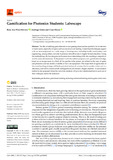Mostrar el registro sencillo del ítem
Gamification for photonics students: labescape
| dc.creator | Pérez Herrera, Rosa Ana | es_ES |
| dc.creator | Tainta Ausejo, Santiago | es_ES |
| dc.creator | Elosúa Aguado, César | es_ES |
| dc.date.accessioned | 2022-08-09T11:38:09Z | |
| dc.date.available | 2022-08-09T11:38:09Z | |
| dc.date.issued | 2021 | |
| dc.identifier.citation | Pérez-Herrera, R. A.; Tainta, S.; Elosúa, C. (2021). Gamification for photonics students: labescape. Optics. 2,(4), pp. 228-235 | en |
| dc.identifier.issn | 2673-3269 | |
| dc.identifier.uri | https://hdl.handle.net/2454/43735 | |
| dc.description.abstract | The idea of utilizing game elements in non-gaming situations has sparked a lot of attention in recent years, especially in topics such as education and training. Game-based techniques appear to be an increasing trend in a wide range of learning areas, including health, social policy, and engineering, among others, not only in primary school but also in higher formal education. Using this methodology, the learning process becomes more stimulating while also reaching a competitive level in some circumstances. In the present work, the authors propose a new gamification strategy based on an escape-room in which all the puzzles to be passed are related to the area of optics and photonics and use readily available or low-cost equipment. The major field of application of this novel teaching strategy will be the practical section of a course, that is usually carried out in a laboratory, and will be aimed at both undergraduate and master's degree students. A coevaluation method is also proposed where the rest of the students will provide valuable feedback to each one of their colleagues and to the instructor. | en |
| dc.description.sponsorship | This research was funded by the Electric, Electronic and Communications Engineering Department of Public University of Navarre. | en |
| dc.format.mimetype | application/pdf | en |
| dc.language.iso | eng | en |
| dc.publisher | MDPI | en |
| dc.relation.ispartof | Optics, 2021, 2 (4), pp. 228-235 | en |
| dc.rights | © 2022 by the authors. This article is an open access article distributed under the terms and conditions of the Creative Commons Attribution (CC BY) license | en |
| dc.rights.uri | https://creativecommons.org/licenses/by/4.0/ | |
| dc.subject | Gamification | en |
| dc.subject | Game-based learning | en |
| dc.subject | Technology enhanced learning | en |
| dc.subject | Serious game | en |
| dc.subject | Motivation | en |
| dc.title | Gamification for photonics students: labescape | en |
| dc.type | Artículo / Artikulua | es |
| dc.type | info:eu-repo/semantics/article | en |
| dc.date.updated | 2022-08-09T10:59:50Z | |
| dc.contributor.department | Ingeniería Eléctrica, Electrónica y de Comunicación | es_ES |
| dc.contributor.department | Ingeniaritza Elektrikoa, Elektronikoa eta Telekomunikazio Ingeniaritza | eu |
| dc.contributor.department | Institute of Smart Cities - ISC | es_ES |
| dc.rights.accessRights | Acceso abierto / Sarbide irekia | es |
| dc.rights.accessRights | info:eu-repo/semantics/openAccess | en |
| dc.identifier.doi | 10.3390/opt2040021 | |
| dc.relation.publisherversion | https://doi.org/10.3390/opt2040021 | |
| dc.type.version | Versión publicada / Argitaratu den bertsioa | es |
| dc.type.version | info:eu-repo/semantics/publishedVersion | en |
| dc.contributor.funder | Universidad Pública de Navarra / Nafarroako Unibertsitate Publikoa | es |



